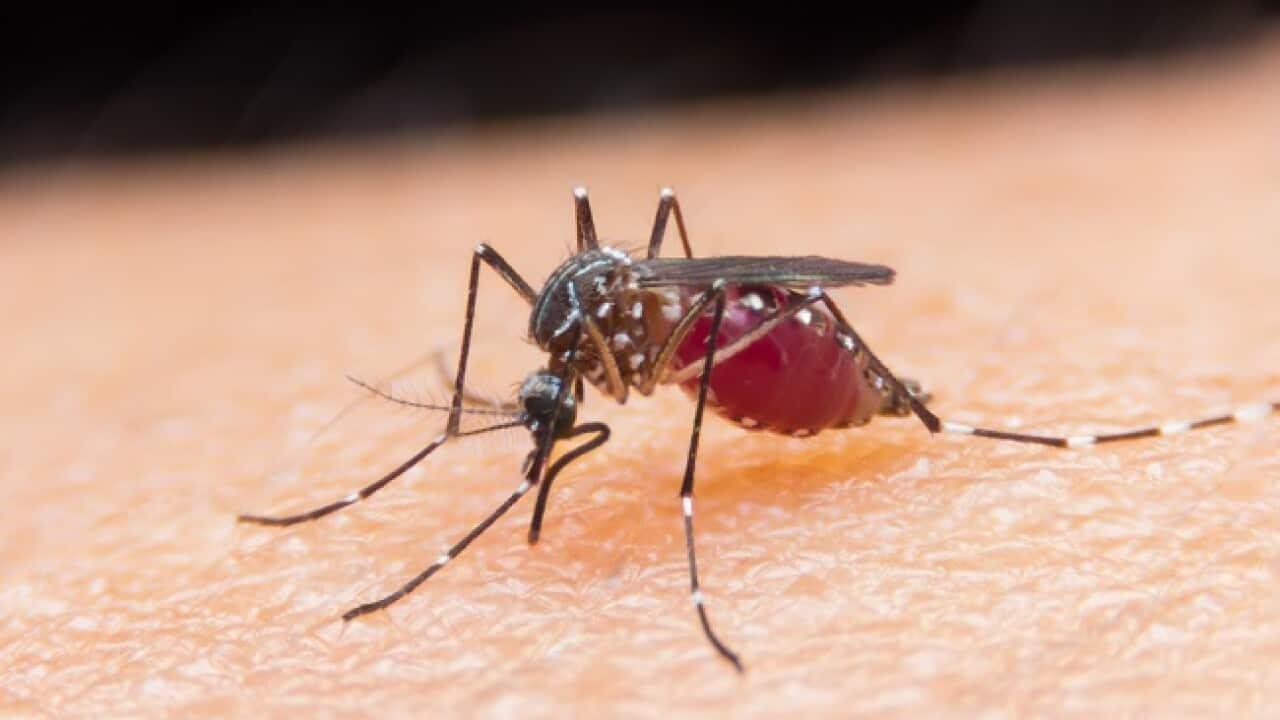Health authorities are on high alert after a potentially-deadly virus was detected in dozens of piggeries across NSW, Queensland, South Australia and Victoria.
The Japanese encephalitis (JEV) virus typically infects pigs and birds but can jump to humans through mosquito bites.
While the vast majority of humans develop no symptoms, the virus can - in rare cases - lead to a deadly brain infection.
Japanese encephalitis is common throughout Papua New Guinea and the Torres Strait, but is only occasionally seen in mainland Australia - typically in far north Queensland.
Australia's acting chief medical officer, Dr Sonya Bennett, has declared JEV as a "communicable disease incident of national significance".
As of Tuesday afternoon, there were nine confirmed human cases of JEV in Australia, including a man and a child in country NSW who have been hospitalised, and a number of cases under investigation.
On Tuesday night, the Victorian Department of Health confirmed a man, aged in his 60s from northern Victoria, died on 28 February and an autopsy revealed the cause of death as Japanese encephalitis.
It is investigating how he contracted the virus.
"Our thoughts are with his family and friends at this incredibly difficult time," a department spokesperson said in a statement on Tuesday.
How dangerous is JEV?
Griffith University immunologist Dr Ali Zaid said Japanese encephalitis virus was a "flavivirus" - coming from the same family as the dengue fever virus and the yellow fever virus.
Dr Zaid said 99 per cent of humans who were infected would remain healthy without displaying any symptoms.
"But in about one per cent of people this can progress to disease that includes encephalitis," Dr Zaid said.

Malaysian vets vaccinate pigs to prevent Japanese encephalitis virus during an outbreak in 1999. Source: AAP / ALAN TEH/AP
Encephalitis is the medical term for brain swelling. Other symptoms in humans include headache, fever, neck stiffness and, in some instances, paralysis.
JEV has so far been detected in some 42 piggeries across Queensland, Victoria, South Australia and NSW.
How does it spread?
Humans contract Japanese encephalitis virus through mosquito bites.
The virus cannot be spread from human to human, and cannot by caught by eating pork products.
Pigs and water birds are the main reservoirs. They infect mosquitoes, which in turn spread the virus to humans.
Hundreds of thousands of pigs were euthanised during a major outbreak of JEV in Malaysia in the late 1990s.
Typically, Australia's human cases of JEV have been limited to far north Queensland.
But it is thought that recent extreme weather, fuelled by climate change, is the reason the virus is spreading south.
University of Queensland virologist Roy Hall said JEV was likely introduced to mainland Australia from Papua New Guinea or Indonesia.
"Its spread to south-east Australia follows heavy rainfalls in central Australia and in the Murray Darling basin where the virus is carried to the south-east by infected waterbirds flying south, cycling between the birds and mosquitoes at flooded bodies of water where they rest and so on."
How do I stay safe?
The NSW health department stresses the importance of protecting yourself against mosquito bites to reduce the risk of JEV transmission.
This includes covering up bare skin when outside and applying mosquito repellent to exposed skin.
"Using mosquito repellents with DEET or Picaridin, avoiding being outdoors at dusk and dawn, and eliminating pooled stagnant water around the house are the best ways to limit these mosquitoes breeding," Dr Zaid said.
Professor Kain Leder, the head of Monash University's infectious diseases unit, said there were two JEV vaccines available in Australia, but these were usually only given to travellers.
However, this could change if the outbreak starts spreading quicker.
"As further data on the number and extent of local JE cases emerges, public health authorities may need to consider expanding vaccine recommendations for those likely to be exposed," she said.











